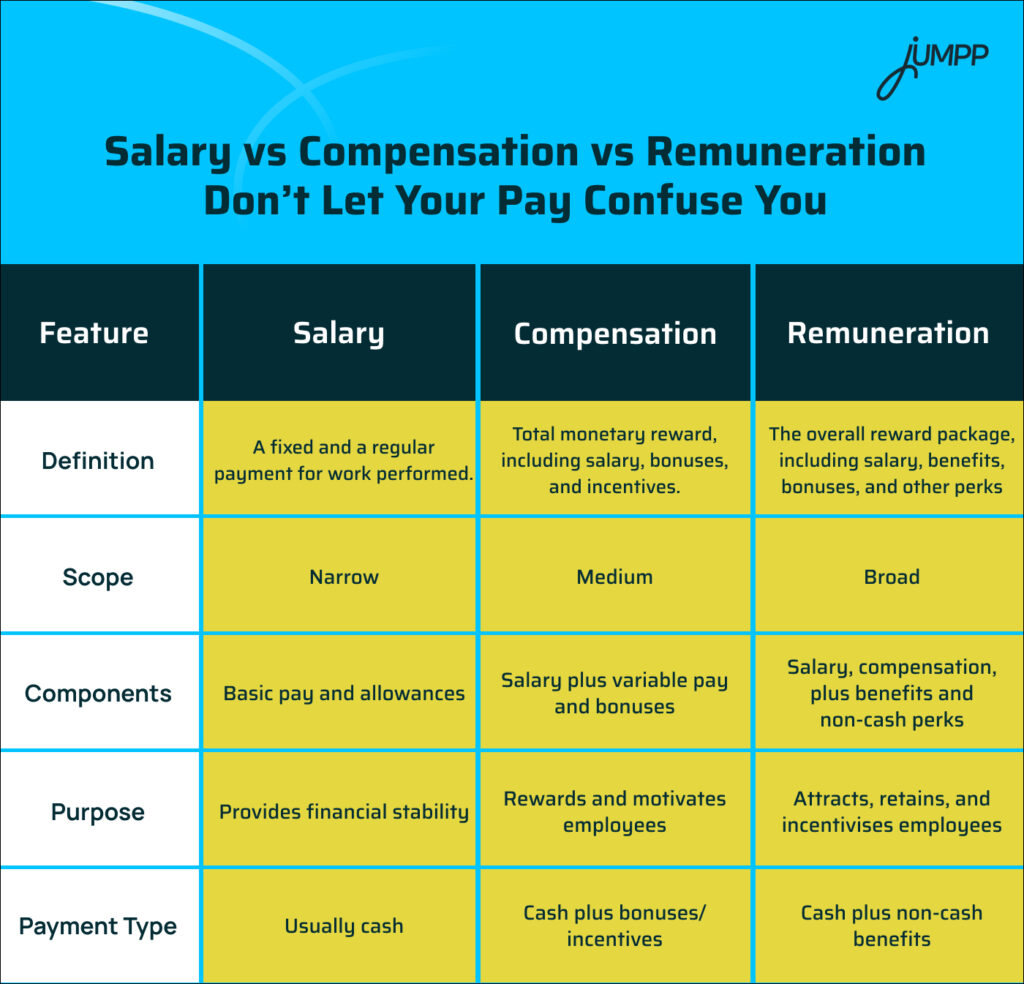What is Remuneration? Everything You Need to Know About Employee Pay

Many of us treat salary as the ultimate measure of our hard work, ignoring the other rewards that make up our total remuneration. In reality, what we receive from an employer goes beyond salary. Health insurance, allowances, and additional benefits all form part of remuneration. This means a salary of ₹50,000 may actually be worth much more once the full package is considered. But before we explore the differences between remuneration, salary, and compensation, let us first understand what is remuneration.
What is Remuneration?
Remuneration refers to the total payment or reward you, as an employee receives in return for your services to an organisation. It includes all forms of financial and non-financial benefits provided to employees.
It consists of a fixed salary or wages, and variable components such as bonuses, commissions, and allowances. Additionally, it also contains the non-monetary benefits like health insurance, retirement plans, and paid leaves.
Remuneration of Employees – What are the Components?
The remuneration of employees includes multiple components.
Let us understand each.
- Basic Salary – This is the fixed amount an employee earns regularly before any deductions.
- Allowances – This can include extra payments like house rent allowance (HRA), transport allowance, medical allowance, etc.
- Bonuses – These can be performance-linked, festival-linked or annual bonuses.
- Incentives – Most of the organisations make these payments when you achieve targets or goals.
- Benefits and Perks – Health insurance, retirement contributions, stock options, and other non-cash benefits.
What are the Types of Remuneration?
Remuneration is classified into two categories-
1. Direct (Financial) Remuneration
These are monetary payments an employer provides in exchange for an employee’s labour. They include:
- Base Salary/Wages (Know the diffrence between wages and salary!)
- Commissions are based on performance
- Bonuses and Incentives
- Overtime Pay
- Paid Expenses/ Reimbursements for work-related costs such as travel, accommodation, or meals.
2. Indirect (Non-Financial) Remuneration
These are non-cash benefits that enhance an employee’s overall compensation and well-being.
They include:
- Employee Benefits– such as health insurance, life insurance, etc.
- Retirement Benefits– such as EPF.
- Paid Time off– like paid vacation, sick leave, and holidays.
- Wellness Programs– such as fitness programs or mental health support.
- Other perks– can be subsidised meals, transportation assistance, flexible work hours, childcare assistance, educational opportunities, recognition awards, or professional development support.
Meaning of Salary
A salary is a fixed amount of compensation that an employer pays to an employee in return for the work they do. Unlike hourly wages, a salary does not vary based on the number of hours worked. It is usually paid at regular intervals, such as monthly or bi-weekly.
The overall salary package is commonly known as the “Cost to Company” or CTC.
What is the Difference Between Salary and Remuneration?
A salary represents a fixed payment that an organisation makes to an employee at regular intervals.
Remuneration, on the other hand, contains the complete compensation package, including both monetary and non-monetary benefits.
Salary is a part of remuneration, but remuneration represents the full value of what an employee receives for their work.
Comparison of Salary and Remuneration
| Basis | Salary | Remuneration |
| Definition | A fixed amount of money is paid to an employee at regular intervals. | The total reward and compensation an employee receives for their work. |
| Components | It includes the basic salary and allowances | It includes the salary along with variable components and additional perks such as bonuses, commissions, etc. |
| Predictability | It offers a consistent and predictable income. | It can vary based on performance, company profits, or contractual terms. |
What is the Meaning of Compensation?
Compensation is another term often used interchangeably with remuneration. But it is slightly narrower in scope. Compensation usually refers to the total monetary benefits an employee receives, combining both fixed and variable pay.
Remuneration vs Compensation
Compensation includes all the financial and non-financial rewards an employee receives for their work. Remuneration, on the other hand, refers more specifically to the monetary payments an employee earns.
In simple terms, remuneration is part of compensation, but compensation covers the full range of rewards, both tangible and intangible.
Comparison of Compensation and Remuneration
| Basis | Compensation | Remuneration |
| Meaning and Scope | It is a broad term that includes all forms of financial and non-financial benefits. | It refers more narrowly to the monetary payments and tangible financial benefits an employee receives. |
| Key Components | Includes both: • Remuneration (direct payments such as salary, wages, bonuses, and commissions) • Non-monetary benefits (indirect compensation such as health insurance, retirement plans, paid leave, and tuition reimbursement) | Includes: • Salary or wages • Bonuses and incentives • Commissions • Overtime pay • Other financial allowances |
Salary vs Compensation vs Remuneration

Salary, Compensation, and Remuneration in Real Life
Let us take an example-
- Salary: An employee receives ₹50,000 per month as fixed pay.
- Compensation: In addition to the ₹50,000 salary, the employee gets a performance bonus of ₹10,000 and a commission of ₹5,000. The total compensation is ₹65,000.
- Remuneration: Along with the ₹65,000, the employee also receives health insurance, paid leave, and a retirement fund contribution. The total remuneration is now much higher than the cash received.
Looking to make the most of your salary and benefits?
Start building wealth with the best investment app in India and explore smart options in equity stocks and mutual funds.
Conclusion
In summary, the terms remuneration, salary, and compensation are interconnected.
However, they hold different meanings.
Salary = Fixed monthly pay.
Compensation = Salary + bonuses and variable pay.
Remuneration = Compensation + benefits and perks.
Remuneration Meaning- FAQs
Remuneration is the total payment or reward an employee receives for their work, including salary, bonuses, and benefits.
The full meaning of remuneration refers to all financial and non-financial rewards provided to an employee in exchange for their services. It covers salary, incentives, perks, and benefits.
Remuneration of pay is the complete compensation package an employee receives, combining fixed salary, bonuses, allowances, and other benefits.
No, remuneration is broader than salary. Remuneration includes salary plus bonuses, incentives, and benefits. However, your salary is the fixed part.
Remuneration can be expressed monthly or yearly, depending on the organization’s pay structure and reporting format.
Salary is a fixed regular payment to an employee, whereas remuneration includes salary plus all other monetary and non-monetary benefits.






